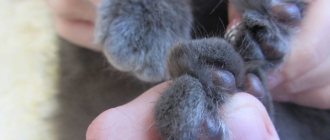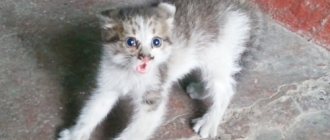The cat may appear suddenly. A homeless kitten will rush to you with a plaintive meow, your grandmother will leave the pet as an “inheritance” or your children will give it as a gift. But what if you have the opportunity to choose your own pet, your ideal companion for many years to come?
It is possible to make the right choice if you approach the issue consistently and with a cool head. How can this be, you exclaim indignantly, because you need to choose a kitten not with your mind, but with your heart! Okay, but where to choose - in a shelter, on an advertisement site, in an elite nursery? What breed of kittens should I look for, and do I need a breed at all? Among the kittens that are as similar as two peas in a pod, would you prefer a girl or a boy?
There are so many questions that make your head spin, especially if this is your first cat. We will deal with each point in order so that you can make a choice with a light heart. Think about what you expect from your pet. Then it will be clear which kitten is better to take in accordance with these requests.
Author of the article: Olga Shiltsova, practicing veterinarian, author of the books “Dachshund of Fate” and “Tails of Fortune”
Origin matters: whether to buy a purebred kitten
Mixed-breed cats are great. A variety of colors and coat types, high intelligence and vitality - all this is inherent in outbred animals. A barn cat can grow larger than a Maine Coon, fluffier than a Persian, and nobler than any breed. Except that there are no sphinxes among them yet. Then does it make sense to buy a kitten from an elite cattery if it is possible to adopt a pet for free? In addition, it is outbred kittens that usually need a home and caring hands.
If you want to save someone's life, love all cats in general, or just want a cat of a certain color (pure white or black cat, calico cat), then a mongrel pet is a great option.
What to do when you pick up a kitten from the street
However, a yard kitten is a kind of lottery. It is not known what size he will grow, what character traits will appear. This is a real “pig in a poke”, an option for those who believe in fate or are naturally gambling.
If you want predictability, then a purebred cat is perfect. Despite the fact that any animal is an individual with its own characteristics, there are pronounced breed traits: the Cornish Rex is a sociable electric broom, the British is an independent couch potato, the Maine Coon is a good-natured giant, and so on. You know in advance what the pet will look like (breed standards), the object of admiration for all random guests, your pride.
If you want to breed cats, you need to purchase only animals with documents and good exhibition prospects, and not multiply the army of outbred and stray kittens.
Regarding health problems, there is a persistent myth that mestizos supposedly do not get sick. And they say they don’t need vaccinations, and they can even digest nails and live up to 30 years. Whereas purebred animals are sissies and generally genetic freaks, which is why they live on artificial feed at an exorbitant price.
The truth is in the middle. Various cat breeds do have hereditary diseases (polycystic kidney disease in Persians, osteochondrodysplasia in Scottish Folds). But if you buy a kitten from a club, the risk of such problems is minimized. There are breeds of cats, among which there are often long-livers (18-20 years) - for example, Thai, and in native breeds (Siberian, Russian Blue) - health is no less good than that of yard cats.
Tricolor cat
Outbred kittens just as much need vaccinations, parasite treatments, and quality nutrition as their blue-blooded counterparts.
Thus, a purebred kitten from a nursery is not a matter of prestige or a desire to show off. It’s just that such a pet’s appearance and character traits will form a familiar picture: many people keep only Siamese or only British dogs all their lives, unable to change their favorite breed. And if all your life you have dreamed of a huge cat with tufted ears, affectionate, but so wild in appearance - why not buy a Norwegian Forest kitten or Maine Coon.
What are kittens like in “infancy” and how to handle them?
In the first weeks of their lives, kittens go through approximately the same stages of development. A kitten who begins to get used to people later than usual can also learn to live peacefully with them, but this will require much more time, love and support. Therefore, knowledge of the stages of development of kittens allows us to better understand the characteristic needs and behavioral characteristics of our pets.
Immediately after birth, kittens weigh 85-145 g and respond only to warmth, touch and smell. Due to their acute sense of smell, they find their mother’s personal nipple, which they do not want to share with anyone. Kittens greedily suck milk, but do not yet know how to defecate on their own, so the mother carefully licks under their tail.
In the first week of life, kittens are protected from unnecessary irritants by tightly closed ears and closed eyes. During this time, people are generally discouraged from approaching and picking up kittens unnecessarily. Although it all depends on your relationship with the cat. For example, my cat urgently demanded my constant presence and calmly reacted to the fact that on the very first day I took the kittens in my arms and examined them. Although, as soon as the kitten squeaked after losing its mother, the cat immediately made it clear that “a little bit of good is coming.”
The second week of life is characterized by the fact that kittens begin to see the light and begin to look at the world with blue eyes. Their external auditory canals open and their ears begin to rise; the kittens now urinate and empty their bowels themselves. At this time, their baby teeth begin to cut. It is recommended to carefully pick up the kittens and talk to them gently for a few minutes so that they learn to trust people. But it is still undesirable to take them far from the cat.
In the third week, kittens begin to actively move, play, and stand on their hind legs to get out of their hiding place. During such periods, my cat always lived with the kittens in a convenient cardboard box. It was in the third week that the kittens began to annoy me by scraping their claws on the box, trying to get out into the open. By the way, they still retract their claws ineptly and can scratch them. At the same time, you can place a toilet for kittens next to the box - a cat tired of cleaning up after her offspring will quickly teach them to use the toilet.
At the age of 4-6 weeks, kittens begin to socialize. They are already firmly on their paws and growing rapidly, they know how to take care of themselves and play with each other and with people. From this age, complementary foods are introduced. In most cases, kittens completely switch to artificial feeding at the eighth week of life. By the eighth week, blue eyes begin to acquire the color characteristic of an adult cat.
Despite their increasing independence, it is not recommended to separate 6-8 week old kittens from their mother. Although my personal experience shows that kittens can be given to a loving and caring owner as early as 6 weeks. Of course, it will not be easy for both of them (the kitten and its owner), but with kindness and affection a person can raise a true friend. Whereas 2-3 month old kittens will already have a character established by communication with their previous owners.
But whatever the age of the kitten, respect your little friend, love and appreciate him! After all, cats subtly sense our attitude and mood towards them.
Tags: kittens, adaptation, growth, birth, animals, care
What determines the cost of kittens?
If you decide to buy a purebred pet, then the range of prices for kittens of the same breed will surprise you. Therefore, first of all, you need to decide for what purpose you are buying a cat - as a pet or for participation in exhibitions and breeding.
Officially, purebred kittens are divided into three categories:
- Pat (Pet);
- Breeding;
- Show class (Show).
Show class – the best representatives of the breed, potential exhibition winners and valuable genetic material. These kittens are the most expensive. Taking such a pet for castration is unwise from a financial point of view and sad for the gene pool of the breed.
Most often, kittens of the breeding class are sold - a strong middle class. These cats can participate in breeding because they have no obvious defects and have all the breed qualities.
Pet class are kittens not suitable for breeding. You should find out why. If the defect is the “wrong” color, there is no problem. But if, for example, a kitten’s testicle has not descended into the scrotum, then it will require an expensive castration operation.
The kitten must have a pedigree (4 generations), regardless of what class it belongs to.
Don’t rush to buy a purebred baby at an attractively low price “without documents”, “unscheduled mating”. Most likely, such breeders want money, not improvement of the breed.
A kitten cannot be too cheap if the cat owner purchases high-quality food, gives adults and children vaccinations, visits exhibitions and a veterinarian. Otherwise, the breeder either works at a loss or saves on the health of your future pet.
A cat should not have more than 3 litters per year, while home-grown breeders give birth to kittens at 1-2 months and receive litters from the female 4-5 times a year. Such babies cannot be strong and healthy and often suffer from rickets.
Buying a kitten cannot be an “urgent” matter. It’s better to wait a few months “in line” at a good cattery than to take just any kitten.
Which kitten is better to get: a boy or a girl?
When two-month-old kittens are crawling around in a box, there is not much difference between boys and girls. They are all equally cute. But the pet will grow up quickly, and it is better to think in advance who you want to keep at home - a cat or a male cat.
While the kittens are small there is almost no difference between boys and girls
- Appearance.
In cats, especially purebred cats, sexual dimorphism can be very pronounced. Males are larger, and in males the magnificence of the breed is manifested in all its beauty, to the fullest, while females look more modest. Using Maine Coons as an example: cats reach a record size and weight of 10-12 kg, while cats weigh on average 5-6 kg. In the British, luxurious round cheeks are characteristic of cats.
The general pattern is this: girls are smaller and more graceful, within the same breed or litter. Cats are brutal and spectacular, they have a wider nose, a more massive head and paws.
- Manners.
Cats spend more time grooming their fur and lick themselves often. Cats can be lazy to wash themselves. Females are neat and clean, quickly get used to the tray and learn the rules of behavior accepted in the house.
Even if we are talking about castrated animals, the smell of urine and feces in cats is stronger than in cats.
Some people believe that cats are more likely to be cuddled, cuddled, and purr, but my personal experience does not support this. Cats can be just as affectionately attached to their owners as cats.
Males tend to show independence and arrogance. The cat should feel like a master, the master of his territory - then he will show himself in all his glory, and will be generous with two-legged food givers.
I'll grow up to be a cheeky Brit
- The basic Instinct.
Owners first remember the differences between boys and girls when puberty begins, on average at 6-7 months. Cats begin to mark their territory with urine, may show aggression, and strive to get out of the house. Cats behave similarly during the period of sexual heat: they howl in a bad voice for several days in a row, refuse food, and climb on people. But if a cat’s heat can be waited out, then cats are ready to mate around the clock. This is why almost 100% of cats in the city are neutered, but female cats are not always neutered.
On the other hand, even an uncastrated cat will not bring kittens home. Therefore, if you live in a private house and the pet is kept free-range, a cat is preferable to a cat, which in this case will produce at least 3 litters per year.
- Health.
Castration of a cat is not a complicated or expensive procedure. However, after surgery, the pet will be predisposed to obesity and urolithiasis.
Sterilization of cats is a abdominal operation, and the cost and duration of the procedure is greater than for cats. The recovery period is also more difficult - you have to wear a protective blanket or collar.
Caring for a cat after sterilization (the article will open in a new tab)
But thanks to the wide and short urethra, cats are less likely to suffer from manifestations of urolithiasis - sand does not clog the urethra, but comes out along with the urine. Females are susceptible to other dangerous ailments - tumors of the mammary glands (if not spayed before the first heat) and inflammation of the uterus, if the cat is not spayed and does not give birth.
- Budget.
In the case of purebred animals, the difference in price between boys and girls is colossal. Kittens are much more expensive, because breeders suspect that you can breed a pet without any documents and without registration in the club, and then sell inexpensive kittens from a purebred mother.
But even if you adopt an ordinary yard kitten, you must immediately budget for the sterilization operation. If money is tight, take the boy.
Consequences of early weaning of a kitten from a cat?
Having adopted a kitten before 3 months of age, owners are faced with behavioral disorders. Scientists found that 80% of animals had moderate problems, and 20 had severe problems.
More than 40% of the cats who took part in the study showed aggression towards people and other animals, 32% showed a need to suck on fluffy objects (toys, decorative pillows, blankets).
Be sure to read:
Estrus in cats: how long does it last and how often does it happen, at what age, how to recognize it, how the process proceeds
Untimely weaned individuals have dysfunctions of psychoneurotic origin, adapt less well to environmental changes, are susceptible to stress, and learn more slowly than their counterparts who have been with their mother for up to 12 weeks.
The idea of adopting a kitten during the period of 4-8 weeks seems attractive because of the opportunity to observe the growth and development of the baby, its habits, funny games, and antics.
But such haste threatens the owners and the pet itself with problems that can be avoided with a little patience. What do you think about this?
At what age should you take a kitten home?
If we are talking about a purebred pet, then you need to take a kitten aged 3 months and older. At just over 2 months, babies receive their first vaccination, and at 3 months they receive a second vaccination against cat diseases plus a rabies vaccination. 2 weeks after the second vaccination, the kitten is protected from viruses and is ready to move to a new home.
Only unscrupulous breeders give away 1.5-month-old kittens. We should not forget that such babies can die from panleukopenia, while children and adults will already become attached to the new pet.
Although 3-month-old kittens no longer need their mother's milk, they learn a lot from an adult cat and from playing with their relatives. At 3 months, the cub is already accustomed to using the tray and eating food; he does not have to be babysat all day long.
Grown up kitten
Even if you take a kitten from an ordinary yard cat, you should not take it away from its mother before 2 months of age. It is a mistake to think that the younger the cub, the faster he will get used to his new home. Kittens weaned early may grow up lacking self-confidence and have problems with socialization.
If a tragedy occurs and the kitten has to be artificially fed, this is titanic work. But if the mother cat is okay, don't rush to pick up the kittens. The optimal age is 3-3.5 months, you shouldn’t wait longer either. 4-5 month old adolescents are already forming certain habits and behaviors that new owners may not like.
Why do you need to adopt a kitten from three months?
By the age of 3 months, the kitten is psychologically ready to part with its mother, brothers, and sisters. He will not miss his family for too long, cry, or hide from his new owners. Kids, playing among themselves, involve a cat in the process, which educates them, not allowing them to scratch or bite too much.
Be sure to read:
At what age can you take a kitten away from a cat, when can you give kittens away?
In adult cats, the tendency to aggressively romp and jump on people’s legs is often associated with early weaning. Among animals, there is a clear hierarchical system that indicates to each individual its place and the boundaries of what is permitted.
Kittens actively imitate the behavior of adults. Taking a baby from the street, you can notice that accustoming him to the norms of living in an apartment requires a longer period of time, effort, and perseverance.
He is timid and cautious. Home pupils are sociable, because from a young age they observed that mother is not afraid of people, allows herself to be petted, and plays with people. She will also show you how to use the tray with filler, and that the claws should be sharpened in a strictly designated place. Such lessons are an order of magnitude more effective than human educational measures. By gradually weaning them from breastfeeding at the right time, the cat teaches the children to eat food or natural food.
Another important point is vaccination. Even cats that do not go outside need vaccinations; a person can bring the pathogen on outerwear or shoes. Kittens are vaccinated for the first time at the age of 8-9 weeks of age, having previously undergone anthelmintic treatment.
A repeat visit to the veterinarian for vaccination with a complex drug occurs at 12-14 weeks. Only after this can the baby be released outside, transported on public transport, and allowed to come into contact with other animals. The weakened viruses contained in the vaccination complex form stable immunity to rabies, panleukopenia, chlamydia, rhinotracheitis, and calicivirus for 12 months.
How to choose the best kitten from a litter
Many people take into their home the most “unlucky” kitten that is offered to them, sometimes even with obvious signs of illness. They motivate this by the fact that no one except them will covet the runt, which means the baby will be doomed. Caring for a kitten takes a lot of time and money, and there is no guarantee that the pet will recover. If you are looking for a pet for children, choose a strong, healthy and cheerful kitten.
You can determine whether your baby is healthy without consulting a veterinarian:
- The coat is tangle-free, thick and dry, the skin is free of crusts and dandruff, and free of parasites.
- Clear, wide open eyes with no signs of watery eyes or pus, and the third eyelid is not visible.
- Nose without crusts or discharge.
- The ears are clean inside, without dark brown discharge.
- There are no traces of feces around the anus.
- The tummy is not swollen like a drum, it is soft.
- The kitten does not look emaciated, well-fed and active.
Little kittens are very curious and active. When they are not sleeping, they play almost all the time. If the baby is indifferent to what is happening, this is most likely a sign of illness.
Watch the kitten play with its siblings. If he is aggressive, he will continue to try to dominate. If he is timid and cautious, he can grow up fearful and withdrawn, avoiding communication with people.
A healthy kitten is curious and active
Take the animal you like in your arms. If the baby behaves calmly and friendly, feel free to take it home. If it hisses and scratches desperately, look for another option.
Many people wait for the kitten to come up to its future owner and start playing with him. This is a really good sign. Such a kitten, if properly raised, will grow up to be a sociable, cheerful and friendly cat.











